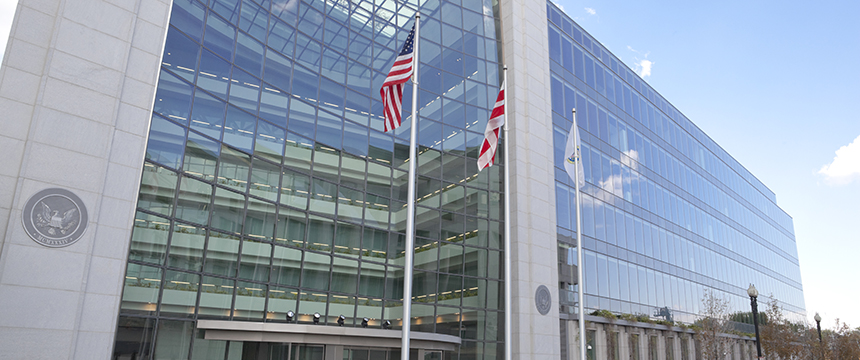Securities and Exchange Commission or Securities and Environment Commission? The SEC Proposes New Rules for Climate-Related Disclosures

On March 21, 2022, the U.S. Securities and Exchange Commission (SEC) released a comprehensive set of proposed rules mandating climate-related risk disclosures for public companies (Proposed Rule).1 For some the release marks “an important and long-awaited step forward”2 and a “watershed moment” for financial markets;3 for others it exceeds the SEC’s statutory authority and “turns the disclosure regime on its head”4 — and these are just the reactions of the commissioners themselves.5 Despite their disparate views, however, each of the commissioners, including SEC Chairman Gary Gensler, encouraged issuers and investors to weigh in on the requirements, consequences, and timing of the Proposed Rule discussed in the 510-page release, each of which is discussed in more detail below.
Highlights of the Proposed Rule
The Proposed Rule requires a public company to make more robust disclosures in its periodic reports with the SEC regarding its exposure to climate-related risks and its impact on the environment, focusing primarily on emission of greenhouse gases (i.e., carbon dioxide, methane, nitrous oxide, hydrofluorocarbons, perfluorocarbons, sulfur hexafluoride, and nitrogen trifluoride). The Proposed Rule, which draws significantly from the guidance provided by the Task Force on Climate-Related Financial Disclosures (TCFD) and the Greenhouse Gas Protocol (GHG Protocol), requires:
- Climate-related risk disclosures in registration statements under the Securities Act of 1933, as amended (the ’33 Act), and in annual reports under the Securities Exchange Act of 1934, as amended (the ’34 Act).
- The Proposed Rule describes climate-related risks as both material physical risks (the risks posed by the impact of climate change such as climate-imposed damage or disruption to the operation of the business) or transition risks (the risk posed by transitioning to a lower-carbon economy and the attendant policy, reputation, legal, technological, and market-driven efforts to mitigate climate change).
- Disclosure of climate-related targets or goals and transition plans, if any, as well as the relevant baseline, metrics, and time expected to achieve the targets or goals.
- Reporting on Scope 1 and Scope 2 emissions by disaggregated greenhouse gases (the seven gases listed above) as well as in the aggregate and in terms of intensity. GHG intensity is the ratio between GHG emissions and economic value — for example, the ratio of metric tons of carbon dioxide per unit of total revenue or production.
- Reporting on Scope 3 emissions if those emissions are material or if the company has set a GHG emissions reduction target or goal that includes its Scope 3 emissions.
- The Proposed Rule includes an additional phase-in period for Scope 3 emissions disclosure, a safe harbor for Scope 3 emissions disclosure, and an exemption from Scope 3 emissions disclosure for a company meeting the definition of a smaller reporting company.
- Attestation reports for accelerated filers and large accelerated filers for Scope 1 and Scope 2 emissions.
- The Proposed Rule allows such attestation reports to be provided by a party other than a registered public accounting firm.
- Inclusion of certain climate-related financial statement metrics and related disclosure in a note to the company’s audited financial statements, including disaggregated climate-related impacts on existing financial statement line items. Disclosure would be required if climate risks affect 1% or more of the absolute value of the line item — meaning gains and losses are added, not netted, in reaching such disclosure determinations.
- Financial statement metrics will be subject to audit by an independent registered public accounting firm and considered within the scope of the company’s Internal Controls Over Financial Reporting (ICFR).
- Disclosure of how a company identifies, assesses, and manages climate-related risks; how such risks are likely to affect its strategy, business model, and outlook; and whether such risks are likely to have a material impact on its business and consolidated financial statements over the short, medium or long term.
- Disclosure of oversight and governance of climate-related risks by a company’s board of directors and management. This oversight will require companies to design and test an array of disclosure and accounting controls needed to ensure compliance.
The Proposed Rule, therefore, will require public companies to develop and design new disclosures and accounting controls that will need to be mapped, tested, and audited.
The SEC’s Prior Efforts to Enhance Climate-Related Disclosures
On February 8, 2010, the SEC published extensive interpretive guidance regarding the extent to which existing disclosure requirements mandated significant and detailed discussion in periodic reports of the risks and costs of climate change that confront public companies. On March 4, 2021, the SEC announced that its Division of Enforcement had created a 22-person ESG task force to investigate and recommend enforcement proceedings in response to misleading statements regarding climate risks and failures by money managers to invest and maintain proper procedures consistent with any professed commitment to prioritize ESG in deploying investor funds.
On March 15, 2021, Acting SEC Chair Allison Lee alluded to the rapid increase in investor interest in the impact of climate change on public companies and the hunger of the investment community for considerably more climate-related disclosure to inform its investment decisions. Acting Chair Lee stated that the SEC wanted more public input into its process of fashioning further guidance on disclosure in this space and solicited answers to 18 questions she believed should inform the SEC’s efforts to enhance the disclosure of climate-related information in the periodic reports of public companies.
On April 19, 2021, the SEC’s Division of Examinations published a Risk Alert describing observed shortcomings of money managers’ professed commitment to investing with an emphasis on ESG. To further inform preparers of securities filings of the heightened expectations of the SEC, in September 2021 the SEC’s Division of Corporation Finance published a form comment letter containing sample observations on the method and quality of climate-related disclosures of a hypothetical public company. Subsequent to releasing this form comment letter, the SEC sent similar comment letters to 38 issuers. The responses from these issuers, in turn, informed the crafting of the Proposed Rule.
Continuing the SEC’s drumbeat, on December 7, 2021, Chairman Gensler predicted that the SEC’s anticipated climate-related risk rules would require public companies to measure the impact of their commitments to mitigating climate change and the challenges they face in responding to climate change. After the Commission signaled earlier in 2022 that its expected rule proposal might be delayed, Senator Elizabeth Warren wrote a letter to Chairman Gensler expressing her displeasure and characterizing the delays as “unwarranted and unacceptable, and violat[ive of] the commitment you made seven months ago [during Gensler’s confirmation process].” On March 15, 2021, Senator Warren again berated the SEC for its delay, stating “it’s taken far too long for the SEC to take action.”
Recent Actions of International Regulators and Their Advisors to Promote Climate-Related Disclosures
The SEC’s release follows extensive efforts by international regulators and their advisers to develop standards for climate-related disclosures that foreign public companies are increasingly expected to publish. For example, in December 2015, the G-20 Financial Stability Board established the TFCD to develop requirements governing disclosure of corporate efforts to address the risks posed by climate change. The work of the TFCD, led by former New York City Mayor Michael Bloomberg and former SEC Chair Mary Schapiro, included defining the metrics companies should use to measure and report on the effectiveness of those efforts. The work of the TFCD features prominently in the substance of the SEC’s Proposed Rule.
According to the TFCD, as of 2021 more than 2,000 companies having a market cap of over $22 trillion and financial institutions managing nearly $180 trillion expressed support for the TFCD’s recommendations. The UK, Australia, Japan, Canada, and Switzerland have already incorporated the recommendations of the TFCD into their mandatory corporate disclosure regimes.
On September 11, 2020, the Carbon Disclosure Project (CDP), the Climate Disclosure Standards Board, the Global Reporting Initiative, the International Integrated Reporting Counsel, and the Sustainability Accounting Standards Board (SASB) jointly published a report proposing a framework and standards for sustainability disclosure, including climate-related reporting. In November 2021, in response to strong demand from investors, the International Financial Reporting Standards Foundation established the International Sustainability Standards Board (ISSB). In June 2022, the ISSB is scheduled to merge with the Climate Disclosure Standards Board and the Value Reporting Foundation (the entity that oversees the Integrated Reporting Framework and SASB standards) to align their standards and frameworks. The ISSB is expected to build on the work of the TFCD and other sustainability standard setters to develop disclosure standards that provide financial markets with actionable information on companies’ exposure to climate change risk and the impact of those companies on the environment.
The foregoing suggests that, as Senator Warren concluded, the SEC has been late to adopt climate-related disclosure requirements that apply to public companies in the U.S. and elsewhere. That perception, and many of the nearly 600 comments received in response to Acting Chair Lee’s March 2021 invitation, has undoubtedly prompted the SEC to advocate for the extensive disclosure contemplated in the Proposed Rule.
Overarching Disclosures
The Proposed Rule requires a public company to disclose information about its climate-related risks that are reasonably likely to have a material impact on its business, including consolidated financial statement metrics and GHG emissions metrics that are aimed at helping investors assess climate-related risks. More specifically the Proposed Rule requires a public company to disclose:
- The oversight and governance of climate-related risks by a company’s board and management; any board committees responsible for oversight of climate-related risks; whether any specific board member has climate-related risk expertise and, if so, a description of such expertise; and how frequently the board committees discuss climate-related risks.
- How any climate-related risks (physical risks or transition risks) identified by the company have had or are likely to have a material impact on its business and consolidated financial statements, which may manifest over the short, medium, or long term. Companies would be required to describe what they mean by “short, medium, or long term.” Companies also would be required to describe physical risks as either acute or chronic and would have to provide the ZIP code location of the properties or operations subject to physical risk
- How any identified climate-related risks have affected or are likely to affect the company’s strategy, business model, and outlook. Companies would need to disclose how these risks affect their consolidated financial statements. If companies use carbon offsets or renewable energy credits in their emissions reduction strategies, they would need to disclose the short- and long-term risks associated with such offsets and credits. If companies use an internal carbon price to evaluate climate risk or determine climate strategy, they would be required to disclose how such a price was determined, including the price per metric ton of carbon dioxide. If companies describe the resilience of their business strategy, they would need to describe any analytical tools, such as scenario analyses, that they used to evaluate the impact of climate risks. Use of scenario analyses will require a robust description of the assumptions and parameters of such analyses.
- The company’s processes for identifying, assessing, and managing climate-related risks and whether any such processes are integrated into the company’s overall risk management system or processes.
- Reporting on the impact of climate-related events on the line items of the company’s consolidated financial statements and related expenditures, and disclosure of financial estimates and assumptions impacted by such climate-related events and transition activities, including:
- Severe weather events and other natural conditions;
- Physical risks; and
- Transition activities (including transition risks identified by the company).
- Scopes 1 and 2 GHG emissions and intensity, separately disclosed, and Scope 3 GHG emissions and intensity, if material, or if the company has set a GHG emissions reduction target or goal that includes its Scope 3 emissions.
- The company’s climate-related targets or goals and transition plan, if any. Any transition plan discussion would need to address relevant metrics and targets.
When responding to any of the Proposed Rule’s provisions concerning governance, strategy, and risk management, however, a company may also disclose information concerning any identified climate-related opportunities.
Specific GHG Disclosures
All companies must disclose Scope 1 emissions, which are direct GHG emissions that occur from sources owned or controlled by the company. In addition, all companies must disclose Scope 2 emissions, which are emissions primarily resulting from the generation of electricity purchased and consumed by the company. Companies must disclose both Scope 1 and Scope 2 emissions as disaggregated constituent greenhouse gases and in the aggregate, including in terms of intensity. The SEC reasoned that by requiring disaggregated data, investors could gain actionable information regarding the relative risks to the company posed by each constituent greenhouse gas in addition to the risks posed by its total GHG emissions by scope.
Scope 3 emissions are indirect emissions not accounted for in Scope 2 emissions, meaning emissions that are a consequence of the company’s activities but are generated from sources that are neither owned nor controlled by the company, such as suppliers, vendors, and customers. Scope 3 emissions are required to be disclosed if those emissions are material or if the company has set a GHG emissions reduction target or goal that includes its Scope 3 emissions. The Proposed Rule includes a phase-in period for Scope 3 emissions disclosure, a safe harbor for Scope 3 emissions disclosure, and an exemption from the disclosure requirement for a company meeting the definition of a smaller reporting company.
In addition to the aggregate emissions of GHG, the Proposed Rule requires disclosure of the sum of Scope 1 and 2 emissions in terms of GHG intensity. For companies reporting Scope 3 emissions, they must also disclose a separate GHG intensity for those emissions.
Liability for Non-Compliance
The Proposed Rule requires companies to file, rather than furnish, climate-related disclosures. Thus, the disclosures are subject to potential liability under Section 11 of the ’33 Act and Section 18 of the ’34 Act. The exception would be for disclosures furnished on Form 6-K as disclosures on Form 6-K are treated as furnished under the SEC’s foreign private issuer disclosure system.
Scope 3 emissions disclosure also would enjoy a safe harbor from certain forms of liability. The SEC recognizes that information about Scope 3 emissions is outside a company’s control and may be difficult for a company to verify, such that a company will need to rely on estimates and assumptions. The Proposed Rule, as a result, provides that a Scope 3 emissions disclosure will not be a fraudulent statement unless it is shown that such statement was made or reaffirmed without a reasonable basis or was disclosed other than in good faith.
In the commentary to the Proposed Rule, the SEC notes that the existing safe harbor for forward-looking statements under the ’33 Act and the ’34 Act would be available for forward-looking climate-related disclosures. It should be noted, however, that the safe harbor protections for forward-looking statements under the Private Securities Litigation Reform Act of 1995 do not apply to companies that are filing an IPO registration statement and are otherwise subject to the Proposed Rule’s climate-related disclosure requirements.
Timing
The comment period for the Proposed Rule ends on the date that is 30 days after the date of publication in the Federal Register or May 20, 2022, whichever period is longer. May 20, 2022, which is sixty days after the SEC released the Proposed Rule, is in keeping with the SEC’s current practice of providing relatively short comment periods.
The Proposed Rule outlines a phase-in process for all companies, with the final compliance date dependent on the company’s filer status as a large accelerated filer, accelerated or non-accelerated filer, or smaller reporting company, and the content of the item of disclosure. If the effective date of the Proposed Rule occurs in December 2022, and the company has a December 31st fiscal year-end, the compliance date for the Proposed Rule disclosures in annual reports, other than the Scope 3 emissions disclosures,6 would be:
- For large accelerated filers, fiscal year 2023 (filed in 2024);
- For accelerated and non-accelerated filers, fiscal year 2024 (filed in 2025); and
- For smaller reporting companies, fiscal year 2025 (filed in 2026).
Large accelerated filers and accelerated filers would have additional time to transition to the attestation requirements for Scope 1 and 2 emissions. They would have one fiscal year to provide limited assurance and two additional fiscal years to providing reasonable assurance.
For large accelerated filers:
- Initial Disclosures – fiscal year 2023 (filed in 2024);
- Limited Assurance – fiscal year 2024 (filed 2025);
- Reasonable Assurance – fiscal year 2026 (file 2027).
For accelerated filers:
- Initial Disclosures – fiscal year 2024 (filed in 2025);
- Limited Assurance – fiscal year 2025 (filed 2026);
- Reasonable Assurance – fiscal year 2027 (file 2028).
Filers that have a non-calendar year, fiscal year-end that results in their 2023 or 2024 fiscal year commencing before the compliance dates of the Proposed Rule would not be required to comply with the GHG disclosure requirements until the following fiscal year.
Other Observations and Closing Thoughts
The Proposed Rule refers to materiality in a number of instances in connection with the disclosures that should be made. Although there was speculation prior to the release of the Proposed Rule that the SEC might change the traditional definition of materiality for purposes of climate-related disclosures, the SEC did not do so.
In recognition of potential legal challenges to the Proposed Rule, the SEC has made the argument in the release of the Proposed Rule that (1) the proposed disclosures are an outgrowth of current investor demand; (2) many issuers, namely large accelerated filers, are fairly far along in reporting on climate-related matters; and (3) the Proposed Rule will eventually simplify matters for companies and investors by providing a single reporting standard in contrast to the multiple reporting standards and non-uniform reporting under such standards. Whether smaller reporting companies would be able to ramp up in a timely and cost-effective manner to comply with the Proposed Rule is an open question. The SEC acknowledges in the Incremental and Aggregate Burden and Cost Estimates section of the release for the Proposed Rule that the costs of implementing the Proposed Rule are very significant, but what is not said is that the cost of not adopting the Proposed Rule may be more significant.
If adopted, the Proposed Rule would require public companies to significantly expand their investment in the development, design, maintenance, testing, and auditing of disclosure and accounting controls. The quality of that investment, however, will go a long way in minimizing the adverse consequences of any subsequent suggestion of non-compliance.
If you have any questions about these proposed new SEC rules, or about ESG issues in general, please contact any of the authors of this article or your Foley attorney.
1 Proposed Rule available at https://www.sec.gov/rules/proposed/2022/33-11042.pdf.
2 Commissioner Caroline Crenshaw, Statement on the Enhancement and Standardization of Climate-Related Disclosures for Investors (Mar. 21, 2022).
3 Commissioner Allison Lee, Shelter from the Storm: Helping Investors Navigate Climate Risk (Mar. 21, 2022).
4 Commissioner Hester Peirce, We are Not the Securities and Environment Commission – At Least Not Yet (Mar. 21, 2022).
5 The Proposed Rule was supported by three of the four Commissioners with Chairman Gensler, Commissioner Crenshaw, and Commissioner Lee expressing approval of the Proposed Rule and Commissioner Peirce expressing disapproval.
6 Companies subject to the Scope 3 emissions disclosure requirements would have one additional year to comply with those disclosure requirements.



